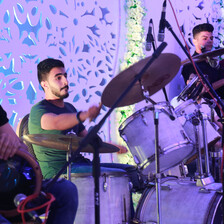The Electronic Intifada 1 July 2021

Sol Band was formed following an Israeli attack on Gaza in November 2012. (Via Facebook)
Sol Band has long sought to spread joy with catchy melodies.
Carrying out that task can sometimes prove too big a challenge. Israel’s 11-day attack on their native Gaza during May was one such time.
Horrified at the violence inflicted on their homeland, the musicians put their instruments aside and watched the news constantly.
“We couldn’t sleep,” said Ahmed Haddad, the group’s lead guitarist. “We were afraid of losing a friend or relative. The pictures coming from Gaza were very shocking. Gaza City became unrecognizable. Full of ruins.”
Sol Band is mostly based in Turkey today. Being away from Gaza while it was bombed meant they were physically safe but that their mental anguish was considerable.
Faris Anbar, the group’s percussionist, recalled how his nieces witnessed a block of apartments being destroyed.
“They were looking out their bedroom window when a whole building collapsed,” Anbar said. “My youngest niece is 5 years old. She didn’t play or talk for days.”
Resilience
Sol Band members regard themselves as fortunate that none of their relatives was killed or wounded during the attack. Once it had ended, the group resumed the task of making music.
Their resilience will hardly come as a surprise to the group’s fans.
Sol Band was, after all, formed following another major Israeli attack on Gaza – that of November 2012.
The group has amassed a large following. One of its most successful projects was to record a series of Arab folk songs for the TV channel Falastini.
The resulting videos – filmed in Gaza’s squares – have been viewed by millions of people on the internet.
Not everyone was impressed, however. The videos – featuring female singer Rahaf Shamaly surrounded by male musicians – were criticized by “some scholars and religious men,” according to Hamada Nasrallah, the band’s lead vocalist.Nasrallah added that the group did not intend to upset people “not used to seeing girls singing in Gaza’s streets.”
“We just wanted to sing and to revive our heritage,” he said. “And we succeeded.”
With Gaza under a full blockade since 2007, the group was initially unable to perform outside the coastal strip.
A breakthrough of sorts came in 2019, when Sol Band was invited to the Palestine Music Expo. As the event took place in the occupied West Bank city of Ramallah, the group needed permits from Israel in order to travel there.
When applying for those permits, group members expected their requests to be rejected. “But miraculously, we got the permits,” Said Fadel, the keyboard player, stated.
“We couldn’t believe it,” he added. “We were performing in Ramallah to our fellow Palestinians. Everyone was singing and dancing together. And we had an advanced sound system and lighting – things we never had in Gaza. It was a dream come true.”
For much of the time since the band’s inception, its members have been at university. After a number of them graduated, they decided to take up music full-time.
As opportunities for musicians are limited in Gaza, Sol Band decided it would be better to leave. Toward the end of 2019, most of the band headed for Istanbul.
“Hardship every day”
The band could not have foreseen that they were emigrating just before COVID-19 would spread around the world.
At first, they were able to adapt. Some work was available for musicians in Turkey’s hotels and restaurants.
That had to change when restrictions were introduced for the catering sector. Without any gigs, the group struggled to pay rent.
Technology has nonetheless allowed the band to keep working with two of its members, who are still at university, back home.
Both Rahaf Shamaly (vocals) and Mohammed Shoman (guitar and bass) have remained in Gaza. Yet they recorded contributions to a video marking Ramadan last year.
The group is now planning an album. “That is our main goal,” said the guitarist Ahmed Haddad. “It is hard to achieve given that we face hardship every day.”
“But we can’t look back,” he insisted. “We have gone through a lot of difficulties to get here. So we won’t let go of our dreams.”
Mousa Tawfiq is a journalist formerly based in Gaza, now living in Paris.





